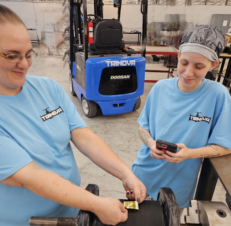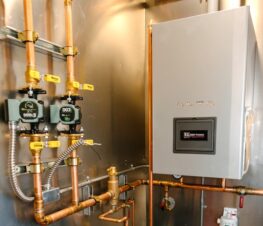According to a recent study by Global Market Insights, the air source heat pump market value is projected to cross $77 billion by 2028. Increasing demand from growing real estate sector along with soaring requirement of space heating applications across colder regions will encourage the product deployment.
Air to water source heat pumps segment is anticipated to witness a noteworthy growth owing to various features including simple design and easy installation, says the report. Rising global temperature and growing green building construction will provide positive drivers for product deployment. Integration with solar heating source and hence low input cost for product across temperate countries will drive the space heating systems demand in the forecast timeline.
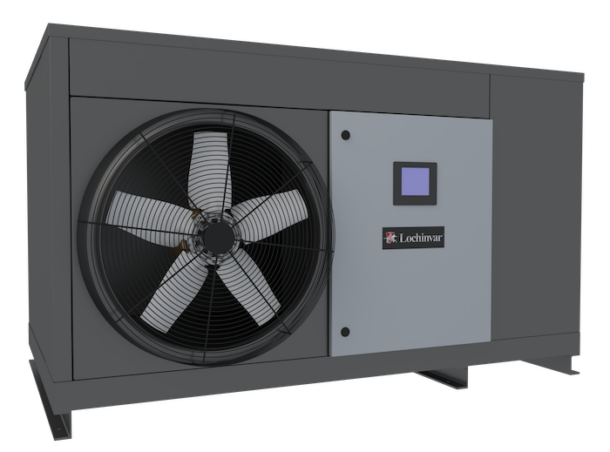
Lochinvar’s air source heat pump water heater
The movement towards electrification—moving away from fossil fuel—seems to be the main driver of the heat pump movement. “I think consumers see an option to add PV, or join a solar garden, to become more energy independent. So having a heating, cooling and DHW option powered by your roof makes some sense. The rise in fossil fuel prices, uncertainty around supply certainly adds some motivation to look at heat pumps,” says Bob ‘Hot Rod’ Rohr, training manager, Caleffi, and former hydronic contractor of more than 30 years.
Recently, Mechanical Hub spoke with Arthur Smith, Residential Product Manager, A. O. Smith, and Jennifer Russell, Segment Development Manager, Decarbonization, Lochinvar, to get the latest on heat pump technology and heat pumps water heaters.
MH: What are some of the driving forces behind this technology?
Arthur: At A. O. Smith, we’ve seen two major driving factors behind the increasing popularity of residential heat pump water heaters. First, as consumers have begun to see wider availability of this technology, along with its carbon emissions reduction and tremendous cost savings, they’ve pushed to utilize heat pump water heaters in their own homes, further increasing demand. The second driving factor we’ve seen is the evolving regulations around decarbonization. These changes have placed an emphasis on heat pump technology as an excellent option for greenhouse gas reduction.
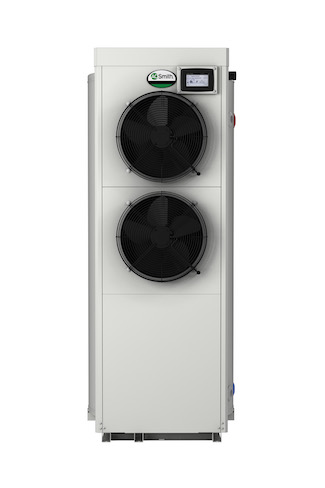
A. O. Smith’s CHP-120 heat pump water heater
Jennifer: On the commercial side, greenhouse gas emission reduction is the main driving force behind the increase and development of heat pump technology. However, due to the lack of availability of commercial heat pump technology, we don’t see it utilized in applications as often as the residential sector. In addition to state and local reduction goals, there are also many companies and building owners who are setting their own goals for reducing greenhouse gas emissions and they’re seeking out heat pump water heaters as a way to meet those goals.
MH: What are the benefits of heat pump technology?
Arthur: The core benefit of heat pump water heaters is the massive jump in efficiency. High efficiencies drive cost savings, which is a huge benefit to homeowners.
Jennifer: One of the main benefits of heat pump technology is that there are zero direct carbon emissions from the unit. For any commercial building looking to decrease its environmental impact footprint, this technology can play a big role in meeting those goals. In addition to the environmental benefits, heat pump technology is also incredibly efficient, providing an average annual efficiency of 200-300%.
MH: Do you see demand for heat pumps more on the residential side than commercial? What is the ratio?
Arthur: Overall, we’ve seen significant interest in both commercial and residential applications.
Jennifer: At Lochinvar, we’ve seen interest in both commercial and residential applications. Interest in ommercial applications for heat pump water heaters has grown significantly in the last couple of years, primarily due to evolving state and local environmental regulations.
Can the grid support a heat pump transition?
Arthur: The grid has been able to support the transition so far, but as heat pump technology continues to increase in popularity, developing the grid will need to be prioritized. It seems that most regulators are aware of this need to develop the grid and are building their regulations accordingly so the grid isn’t overwhelmed.
Jennifer: While the grid may be able to support a heat pump transition eventually, it can’t happen overnight. It’s going to take many years to fully develop a grid that can support a full transition to heat pump technology. In the meantime, we can develop and implement tools, such as demand-response technology, to help support the transition.
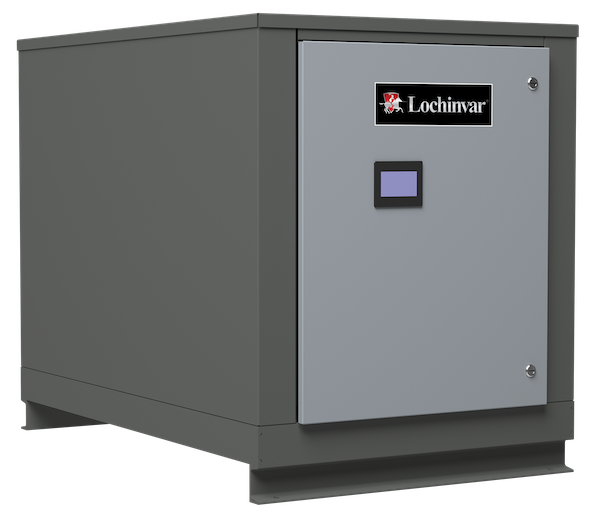
Commercial Heat Pump Water Heater
MH: Is a different skill set required for installation?
Arthur: On the residential side, there isn’t a different skill set required for installation. A. O. Smith designed our residential heat pumps so they can be installed in almost the same way as our standard electric water heaters. There are still some minor considerations, like draining non-acidic condensate produced by heat pumps and differing space requirements, but overall, the installation process is nearly the same as what most contractors are familiar with now.
Jennifer: There isn’t a different skill set required for installation, but there is unique training that can better prepare someone to install or service heat pumps. Heat pump water heaters have features that differ from traditional water heaters and these features require different training. Lochinvar offers training to help educate on the unique application features of heat pump technology.
MH: What is the life expectancy compared to boilers?
Arthur: Our heat pump water heaters are built to the same quality standards as all A. O. Smith products. We put care into developing products that perform well throughout their lifetime. We’re confident in our products and offer a standard 10-year limited warranty on every heat pump we produce.
Jennifer: You’re not going to see any loss of life expectancy with heat pump water heaters. They’re designed to hold up and perform as well as other water heating technology
MH: Do you offer training for these products?
Arthur: Since residential heat pump technology has been around for a bit longer than commercial, we’ve had time to develop training resources that focus on the installation and servicing of these units. A. O. Smith University offers digital live training at www.university.hotwater.com and there are courses available that focus specifically on heat pump technology.
Jennifer: At Lochinvar, we offer training resources to educate sales reps, engineers, contractors and technicians on heat pump technology. At the moment, our heat pump training focuses on topics such as applications for heat pumps, ensuring the correct unit size specification and understanding the technology’s benefits and features.


